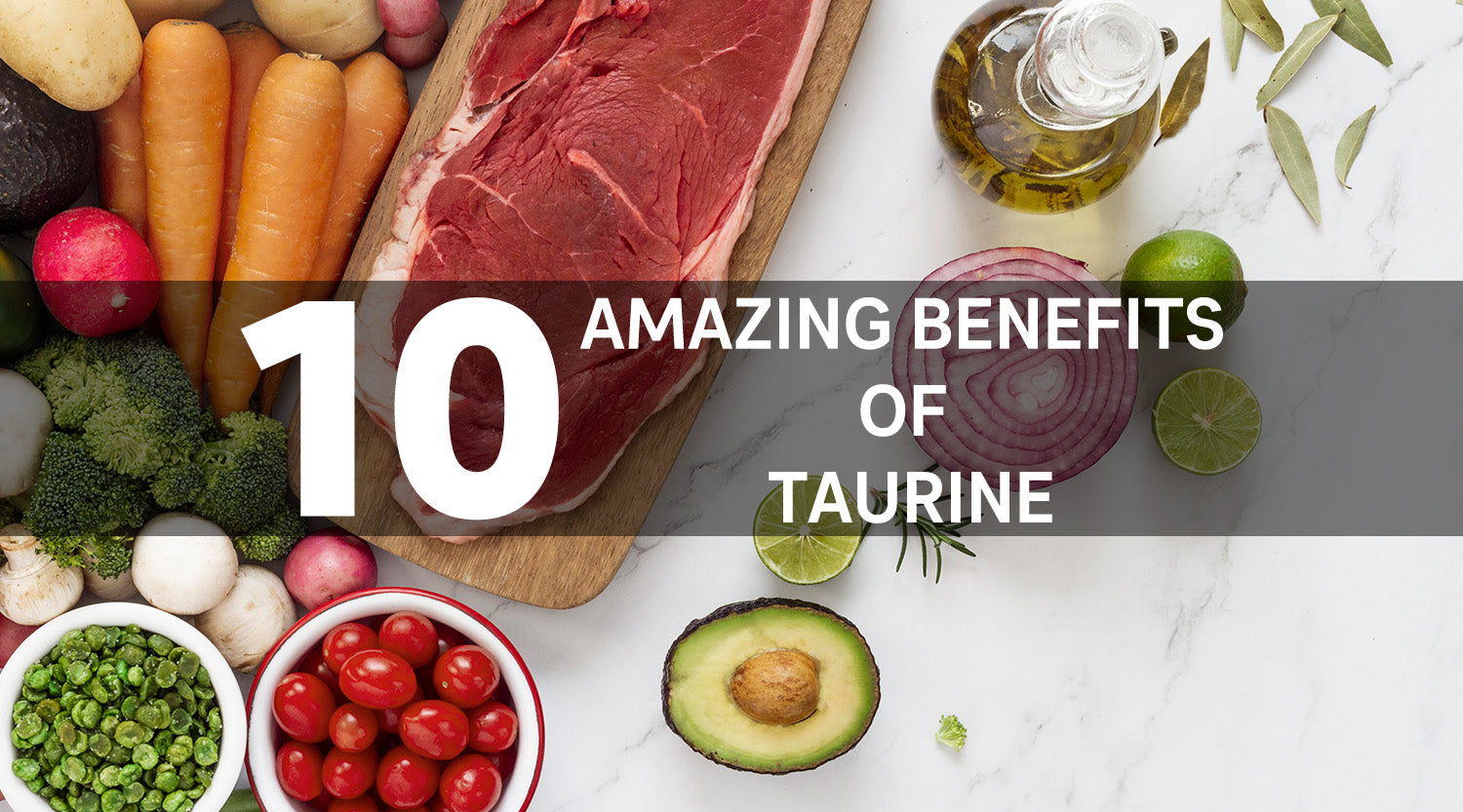
10 Amazing Benefits of Taurine
Taurine is a sulfur-containing beta-amino acid that is ubiquitous in the body and is especially plentiful in electrically excitable tissues, including the heart, retina, brain, and skeletal muscle. It is also non-proteinogenic, indicating that it does not become integrated into proteins during translation.
The Basics of Taurine: Composition and Importance
Taurine is a vital amino acid for our body. It supports many bodily functions, including heart and brain activity. Our body can make taurine, but not enough. So, we need to get it from food or supplements. This amino acid is also found in energy drinks, but natural sources are always best. Taurine plays a crucial role in our health and well-being.
Taurine in the Context of Nutritional Sciences
Taurine plays a vital role in our body's nutrition. It is an amino sulfonic acid, not a building block of protein, but is significant in many metabolic processes. It acts as an antioxidant and supports neurological development. Taurine also helps regulate minerals and supports the immune system. This substance occurs naturally in our bodies and certain foods, proving its importance in a balanced diet. Nutritionists emphasize its role in heart and brain health, muscle function, and energy levels. Understanding taurine's role is crucial for anyone interested in optimizing their nutritional well-being.
Production of Taurine
Taurine, a conditionally essential nutrient, is produced in the liver and can be obtained from certain foods like beef, dark meat poultry, and shellfish. It is made in the body but may not meet all functional needs under certain conditions. Low plasma taurine levels are associated with conditions like cardiovascular disease and type 2 diabetes, so the average adult should not be concerned about overt symptoms of taurine deficiency.
Taurine, an omnipresent body substance, is crucial in various physiological functions such as cell protection, osmoregulation, mitochondrial function modulation, cell membrane stabilization, calcium homeostasis, energy metabolism, neuromodulation, and antioxidant actions.
Important Benefits of taurine
- Essential Amino Acid: Taurine is found in virtually every body cell and is required for proper heart, gastrointestinal, and nervous functioning. It's abundant in human breast milk and essential for early development.
- Liver Health: Taurine promotes bile synthesis, which is essential for detoxifying the liver by breaking down lipids and draining out toxins such as alcohol and heavy metals.
- Mitochondrial Health: It stabilizes the mitochondrial membrane, increasing energy production and supporting muscular health, which makes it popular among athletes.
- Vision Preservation: Vital for retinal health, taurine prevents degenerative eye conditions. Deficiencies can lead to severe eye diseases, so supplements like Tauroursodeoxycholic acid (TUDCA) are recommended for eye health.
- Gut Integrity: Strengthens intestinal cell walls, preventing harmful substances from leaking into the bloodstream, which can trigger autoimmune diseases.
- Musculoskeletal Relief: Supports gallbladder function, which reduces neck and shoulder discomfort by increasing bile flow and decreasing inflammation.
- Stress Reduction: Reduces cortisol and epinephrine levels, which might aid with stress management and perhaps lower blood pressure.
- Auditory Health: Helps to relieve tinnitus by activating Gamma-aminobutyric acid (GABA) receptors in the brain, which block excessive auditory impulses.
- Blood Sugar Regulation: It acts as an antioxidant, enhancing insulin sensitivity and preventing pancreatic damage, which is beneficial for diabetes management.
- Reproductive Health: It improves hormone balance by aiding cholesterol absorption in the liver, which is essential for producing sex hormones.
- Neurological Support: Taurine is abundant in the brain and helps regulate neural activity. It can also prevent neurodegenerative diseases by protecting harmful plaques.
- Dietary Sources: These are best sourced from foods like scallops, turkey, and seaweed or through supplements like ox bile or TUDCA, which improve digestion and overall health. Avoid energy drinks, as they contain processed taurine mixed with high levels of caffeine.

How to Get Taurine: Sources and Best Practices
Natural Food Sources of Taurine
Discovering taurine in food is critical to reaping its perks. This amino acid isn't made by all. Seafood and meats are rich taurine sources. This list covers where to find it:
- Scallops, shrimp, and fish boast high levels.
- Chicken, beef, and lamb provide plenty.
- Seaweed and breast milk contain traces.
- Goat's cheese contains 12.5–16.5% taurine, and the whey from goat milk contains the highest amount of taurine.
Incorporating Taurine-Rich Foods into Your Diet
Including taurine in your meals is easy once you know where to look. Seafoods, such as scallops, mussels, and clams, are packed with taurine. Meat lovers can rely on chicken, beef, and lamb for a good dose. For a plant-based twist, seaweed and tempeh are go-tos. Aim for a mix of these foods weekly to keep taurine levels up.
Tips on Maximizing Taurine Absorption and Retention
Getting the most from taurine is critical. Here are some tips to help:
- Eat taurine-rich foods with meals. This boosts digestion and nutrient uptake.
- Combine with B vitamins. Vitamins B6, B12, and folic acid can help taurine to work in your body.
- Stay hydrated. Water aids taurine and other nutrients in traveling through the body.
- Moderate your caffeine intake. Too much can lower taurine levels.
- Keep a balanced diet. This provides a diverse range of nutrients, which can increase taurine absorption.
Recommended Dietary Allowance for Taurine
- Clinical studies have used a range of 1–6 grams daily for all purposes. The most common protocol to reduce blood pressure is 1.5 grams per day divided into three doses of 0.5 grams.
- For athletic performance, it is recommended that taurine be consumed 60–120 minutes before exercise for peak bioavailability.
Taurine may not receive as much attention as other nutrients, but its benefits for overall health and well-being are undeniable. From supporting heart health and exercise performance to enhancing brain function and immune response, taurine plays numerous essential roles in the body. Whether you're an athlete looking to boost performance, someone concerned about heart health, or simply seeking to improve overall wellness, incorporating taurine into your daily regimen could yield significant benefits. As always, consult with a healthcare professional before starting any new supplement regimen to ensure it aligns with your individual health needs and goals.
References
- Surai, Peter F., Katie Earle-Payne, and Michael T. Kidd. "Taurine as a natural antioxidant: From direct antioxidant effects to protective action in various toxicological models." Antioxidants12 (2021): 1876. https://www.mdpi.com/2076-3921/10/12/1876
- Waldron, M., Patterson, S. D., & Tallent, J. (2018). The effects of taurine on repeat sprint cycling after low or high cadence exhaustive exercise in females. Amino Acids, 50(7), 765-771.
https://link.springer.com/article/10.1007/s00726-018-2554-2
- Schaffer, Stephen W., et al. "Effect of taurine and potential interactions with caffeine on cardiovascular function." Amino acids46 (2014): 1147-1157.
https://link.springer.com/article/10.1007/s00726-014-1708-0
- Louzada, Paulo Roberto, et al. "Taurine prevents the neurotoxicity of β‐amyloid and glutamate receptor agonists: activation of GABA receptors and possible implications for Alzheimer's disease and other neurological disorders." The FASEB journal3 (2004): 511-518.
https://faseb.onlinelibrary.wiley.com/doi/abs/10.1096/fj.03-0739com
Share
